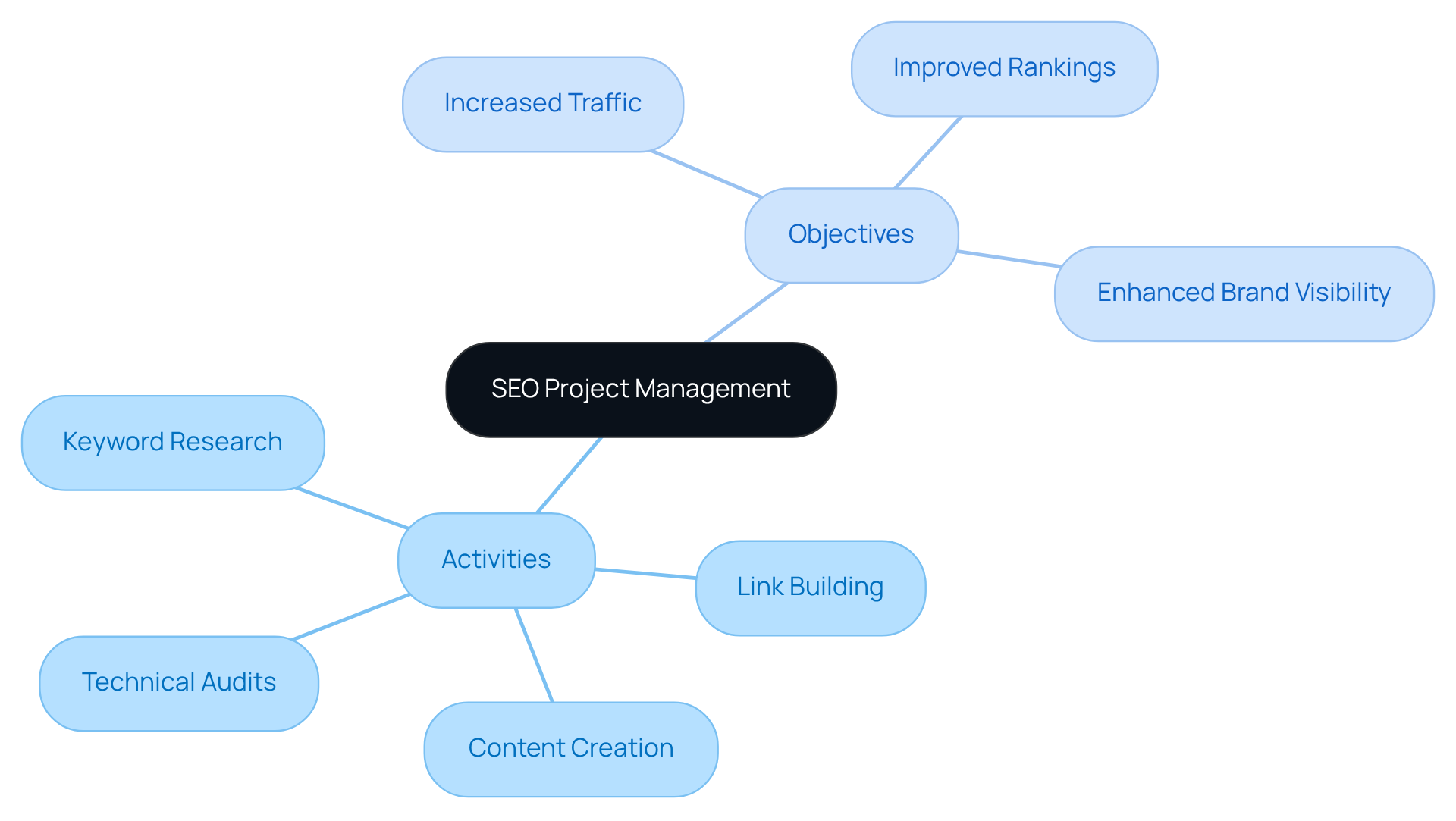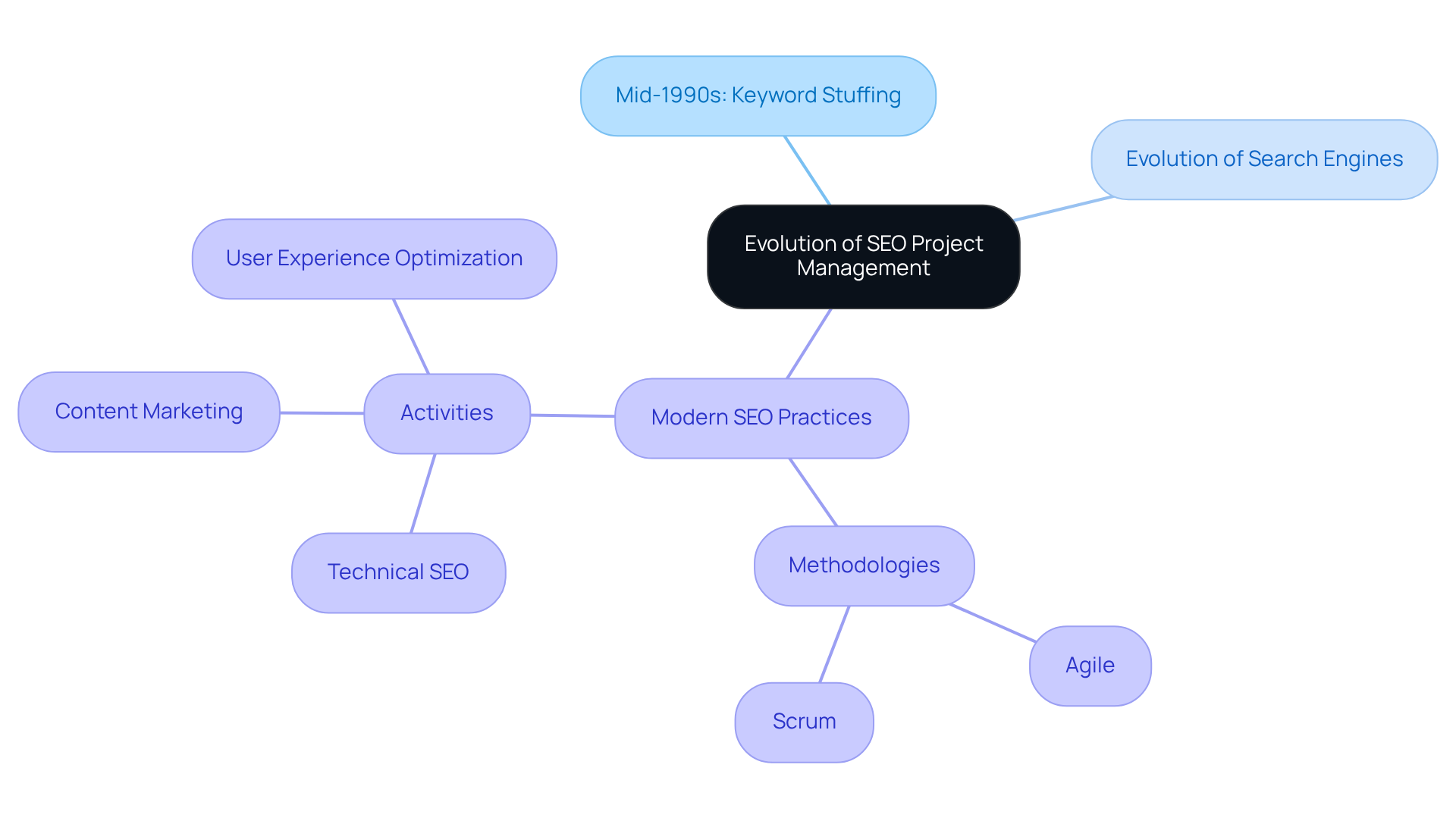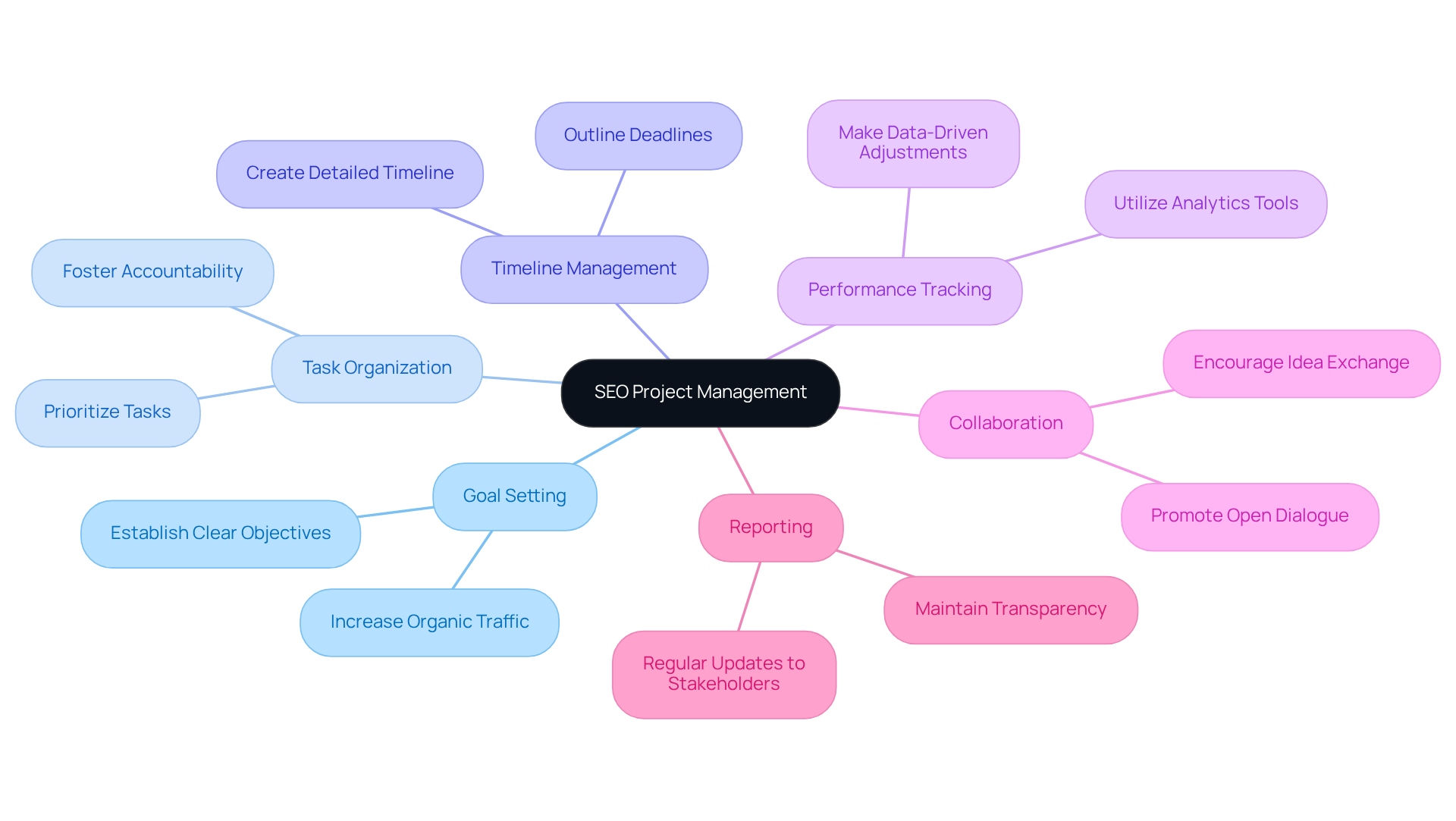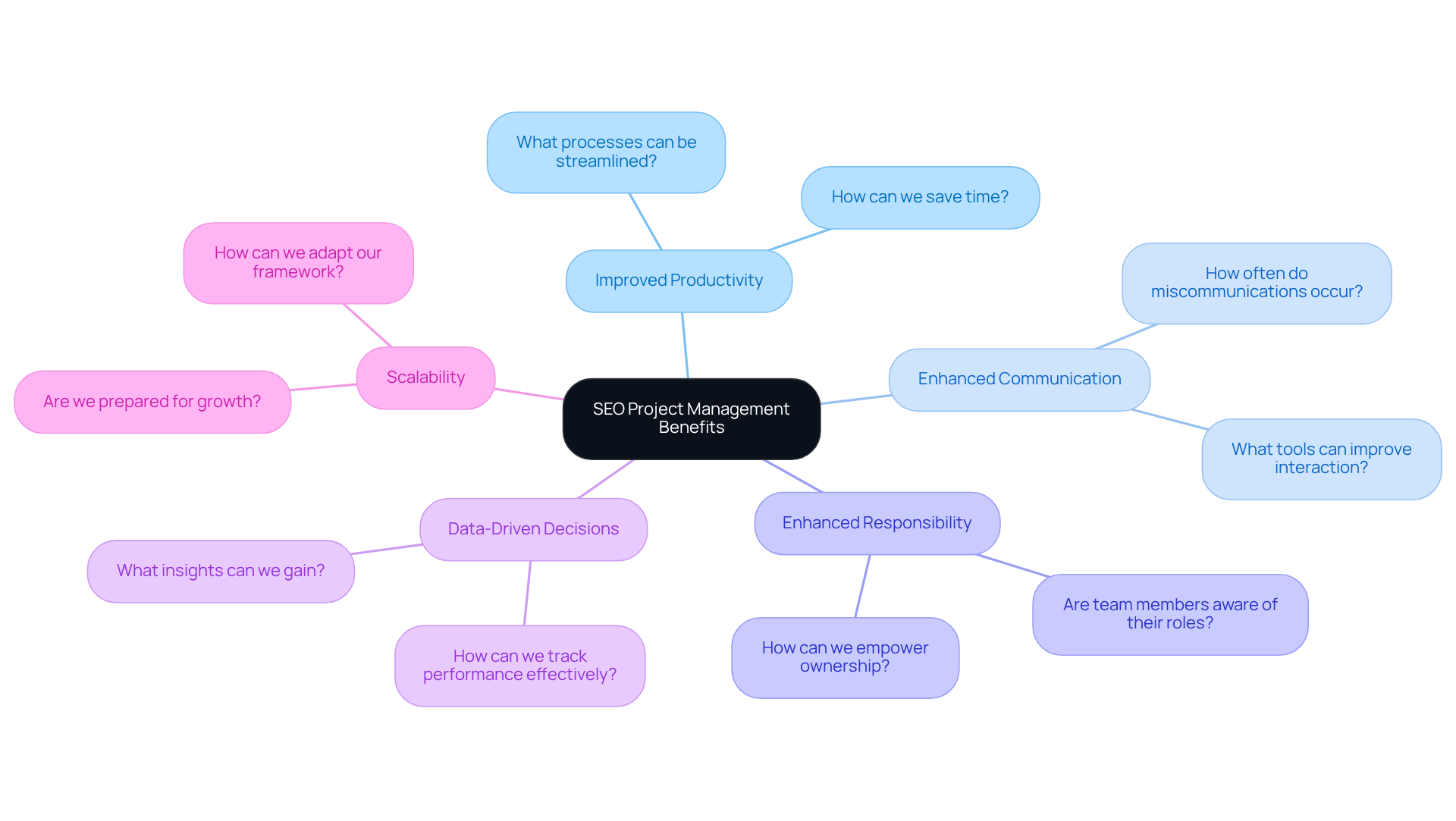Overview
This article defines SEO project management and outlines its essential components, underscoring its critical role in optimizing search engine strategies.
Effective SEO project management is characterized by structured methodologies that facilitate:
- Task coordination
- Goal setting
- Performance tracking
These elements collectively enhance productivity, improve communication, and foster adaptability, ultimately leading to greater online visibility and business growth.
Are you ready to elevate your SEO efforts? Understanding and implementing these strategies can transform your approach and yield significant results.
Introduction
Understanding the intricacies of SEO project management is essential for any business seeking to enhance its online presence. This systematic approach not only streamlines search engine optimization efforts but also aligns them with broader business objectives. By ensuring that every task contributes to increased visibility and performance, organizations can position themselves for success.
However, as the digital landscape evolves, how can businesses effectively adapt their strategies to maximize results? Are they keeping pace with changing algorithms and user expectations?
Exploring the key components and benefits of SEO project management reveals the potential for transformative growth in a competitive environment.
Define SEO Project Management
SEO project management is a systematic approach that encompasses the planning, execution, and monitoring of all activities related to search engine optimization (SEO) efforts. It involves the coordination of various activities, such as:
- Keyword research
- Content creation
- Technical audits
- Link building
All aimed at enhancing a website's visibility and performance in search engine results. By employing structured methodologies, SEO project management ensures that every element of an SEO campaign works cohesively toward achieving specific objectives. These objectives often include:
- Increased traffic
- Improved rankings
- Enhanced brand visibility
Consider the impact of a well-coordinated SEO strategy. Are you maximizing your website's potential? By understanding the intricacies of SEO task coordination, you can unlock opportunities for growth and visibility. This structured approach not only streamlines your efforts but also aligns them with your overarching business goals, making SEO project management essential for any startup founder looking to establish a strong online presence.
In conclusion, effective SEO task coordination is not just about executing tasks; it's about creating a unified strategy that drives results. Embrace this methodology to ensure that your SEO efforts yield the desired outcomes.

Explore the Context and Evolution of SEO Project Management
The concept of SEO oversight has undergone significant transformation since the inception of search engine optimization in the mid-1990s. Initially, SEO efforts revolved around keyword stuffing and elementary on-page optimization techniques. However, as search engines evolved and became increasingly sophisticated, the necessity for a structured approach to SEO project management became apparent. Over the years, the coordination of tasks in SEO project management has adopted various methodologies, such as Agile and Scrum, enhancing collaboration and efficiency in the process.
Today, SEO encompasses a diverse array of activities, including technical SEO, content marketing, and user experience optimization. This evolution reflects the intricate and multifaceted nature of digital marketing. Have you considered how these changes impact your own SEO strategy? Embracing this comprehensive approach can significantly enhance your online presence and drive results.

Identify Key Components of SEO Project Management
Key components of seo project management are crucial for driving success.
-
Goal Setting: Establish clear, measurable objectives for your SEO campaign. For instance, aim to increase organic traffic by a specific percentage. This clarity sets the foundation for all subsequent efforts.
-
Task Organization: Prioritize tasks based on their impact and urgency. This ensures that team members are aware of their responsibilities, fostering accountability and efficiency.
-
Timeline Management: Create a detailed timeline outlining deadlines for each task. This facilitates timely execution and keeps the project on track.
-
Performance Tracking: Utilize analytics tools to monitor the effectiveness of your SEO strategies. Make data-driven adjustments as needed to optimize results continuously.
-
Collaboration: Promote open dialogue among team members. A cooperative atmosphere encourages the exchange of ideas and feedback, driving innovation.
-
Reporting: Regularly update stakeholders on progress and results. This practice maintains transparency and accountability, reinforcing trust in your management capabilities.

Examine the Benefits and Applications of SEO Project Management
Implementing effective seo project management yields significant advantages that can transform your approach to digital marketing.
-
Improved Productivity: By organizing tasks and establishing clear priorities, teams can operate more effectively, significantly reducing the time spent on repetitive activities. Have you considered how much time could be saved by streamlining processes?
-
Enhanced Communication: A systematic method fosters better interaction among team members, minimizing misunderstandings and ensuring alignment with project objectives. How often do miscommunications derail your projects?
-
Enhanced Responsibility: Clearly defined roles and responsibilities empower team members to take ownership of their contributions, resulting in higher quality work. Are your team members fully aware of their responsibilities?
-
Data-Driven Decisions: Regular performance tracking allows teams to make informed choices based on real-time data, optimizing strategies for improved outcomes. What insights could you gain from a more data-driven approach?
-
Scalability: As businesses expand, a robust seo project management framework can adapt seamlessly to accommodate larger teams and more complex projects, ensuring sustained success in a competitive landscape. Are you prepared for the growth ahead?

Conclusion
SEO project management is a vital framework for orchestrating the various elements that contribute to a successful search engine optimization strategy. By systematically planning, executing, and monitoring SEO activities, businesses can significantly enhance their online visibility and achieve specific goals such as increased traffic and improved rankings. This structured approach is essential for any organization aiming to optimize its digital presence and align its efforts with broader business objectives.
Key components of SEO project management have been highlighted, including:
- Goal setting
- Task organization
- Timeline management
- Performance tracking
- Collaboration
- Reporting
Each of these elements plays a crucial role in driving productivity, enhancing communication, and ensuring accountability within teams. By adopting a comprehensive methodology, businesses can navigate the complexities of SEO more effectively, ultimately leading to better outcomes and sustained growth.
Embracing effective SEO project management is not merely a choice but a necessity in today’s competitive digital landscape. Organizations are encouraged to implement these strategies actively, fostering a culture of collaboration and data-driven decision-making. By doing so, they can unlock the full potential of their SEO efforts, ensuring a robust online presence that stands out in an ever-evolving marketplace.
Frequently Asked Questions
What is SEO project management?
SEO project management is a systematic approach that involves the planning, execution, and monitoring of all activities related to search engine optimization (SEO). It coordinates various activities such as keyword research, content creation, technical audits, and link building to enhance a website's visibility and performance in search engine results.
What are the main activities involved in SEO project management?
The main activities involved in SEO project management include keyword research, content creation, technical audits, and link building.
What objectives does SEO project management aim to achieve?
SEO project management aims to achieve several objectives, including increased traffic, improved rankings, and enhanced brand visibility.
Why is structured SEO project management important for businesses?
Structured SEO project management is important because it ensures that all elements of an SEO campaign work cohesively toward achieving specific objectives, aligns efforts with overarching business goals, and streamlines the SEO process.
How can effective SEO task coordination benefit startups?
Effective SEO task coordination can benefit startups by maximizing their website's potential, unlocking opportunities for growth and visibility, and establishing a strong online presence.




